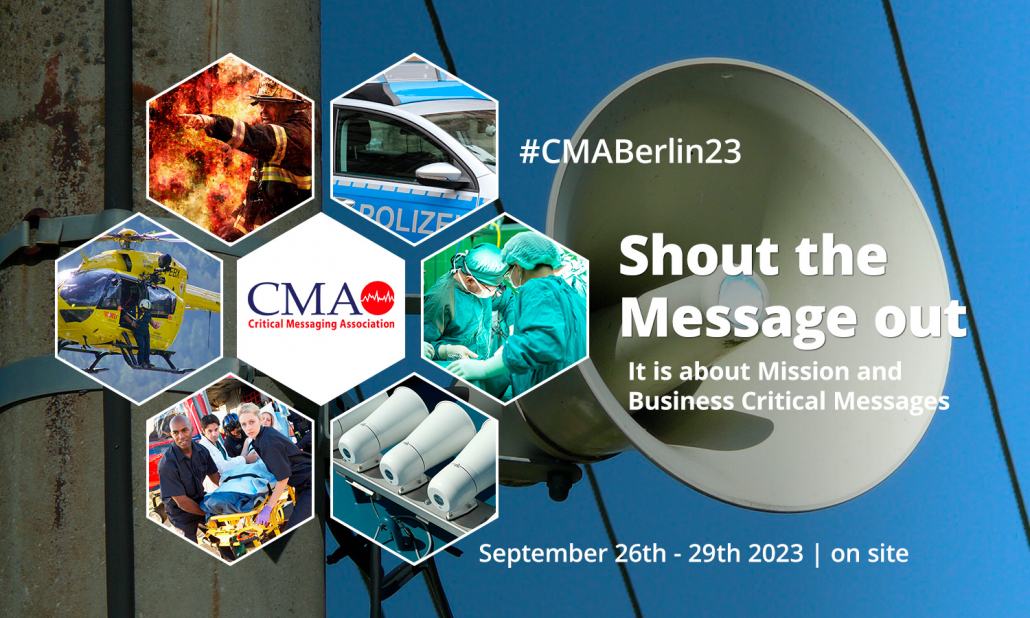International Congress of the Critical Messaging Association #CMABerlin23

- Experts from different continents discussed reliable communication
solutions for professional users - Redundancy maximizes the transmission security of messages
even in critical situations, crises and catastrophe - “CMA Best Marketing Award 2023” for American Messaging
Berlin, October 4, 2023
The Critical Messaging Association (CMA) invited experts from all over the world to the international congress #CMABerlin23 from September 26 to 29, 2023 in Berlin. During the four-day meeting, a professional exchange took place on professional communication solutions that function reliably even in critical deployment scenarios under extreme conditions. In technical papers and discussion panels, CMA members, security communications executives, and guests from science and industry from Europe and North America talked about constructive approaches to solutions. Nearly one billion people could be reached by the services and products of the conference participants. Experts from the U.S., Germany, Austria, Switzerland, France, Italy, the Netherlands, Belgium, Sweden and the U.K., among others, attended the conference. The “CMA Best Marketing Award 2023” was presented to American Messaging at the congress. The award was given for the special commitment to spreading CMA messages via social networks and newsletters.
“In a rapidly changing world, where extreme weather events are increasing, the risk of blackouts is rising, cyber attacks are threatening – and happening – and there is a highly tense security situation worldwide, reliable communication solutions for professional users matter more than ever,” said Dr. Dietmar Gollnick, Chairman CMA, who opened #CMABerlin23. “Because in the event of an incident, crisis or disaster, they make it possible to save lives, avert damage, and restore public order and basic services to the population.” The prerequisite for maximum transmission reliability of messages to professional users such as emergency forces, decision-makers and responsible parties in any situation, he said, is the redundant use of different, different, independent transmission paths and infrastructures. There was consensus on this among the experts.
CMA’s solutions in specialty mobile communications are also combined with common “cellular” services such as LTE and 5G. While the original focus was almost exclusively on paging, there are now many other applications. These often complement or extend the NP2M (Narrowband Point-to-Multipoint – an implementation iost paging) defined at ETSI (European Telecommunications Standard Institute) into hybrid solutions. CMA members are guarantors of mobile alternative infrastructure that works even under extreme conditions. CMA members’ services are used, for example, to supply leading hospital complexes in the U.S. and the U.K., to alert fire departments in Paris and Marseille in France, to feed content to millions of weather stations, to reach first responders in Australia, Belgium, Italy and Austria in a timely and simultaneous manner. CMA members provide solutions for healthcare, among others, as well as for major logistics and energy companies in the U.S., France, Germany and many other countries.
Honorary President of the German Technisches Hilfswerk (THW), Albrecht Broemme, described his thoughts and experiences on “Safety and Communications TODAY and TOMORROW” as Chairman of the German Board of the Future Forum for Public Safety (ZOES) at #CMABerlin23. As a think tank for shaping the future developments of public security in Germany, the ZOES connects members of Deutscher Bundestag across party lines with experts from ministries and federal authorities, from science, aid organizations, associations and business. The core messages from Broemme’s keynote speech: Alarms and warning messages must be broadcast via various channels, not just via smartphones. They must contain clear instructions for action and must be repealed once the dangerous situation has been resolved. They also have to be trustworthy. Paging is particularly suitable as a “trust channel”.
Innovations in paging and mobile communications were the subject of various speeches, discussions and working groups during the rest of the congress. Graeme Hull, Swissphone Group, Switzerland, spoke on “Incident Management: State of the Art. To Dos.” David Villacastin and Jose Costa, TPL Systemes, France, addressed the topic “Market request and great success: MultiChannel,” which Sören Hantke, eMessage WIS Germany, followed up with exactly the right remarks in his presentation “Much more than MultiChannel.” eMessage, headquartered in Berlin, is a special mobile network operator offering safe communication solutions for professional users as well as warning solutions as a partner of Bundesamt für Bevölkerungsschutz und Katastrophenhilfe (German Federal Office of Civil Protection and Disaster Assistance) (BBK). TPL is conducting successful projects in France and the USA on independent transmission paths for siren alerting and public safety.
Madelene Persson, Generic, Sweden, spoke on “Focus Groups for our Services. Latest Development.” In the context of Sweden’s new orientation and integration into the global security structure, Persson raised the issue of new hardware, to which conference participants immediately presented proposed solutions on the spot. Sara Isoardo, Radio Activity JVCKenwood, Italy, spoke about the “View from Milano. User and Product Groups.” Angelo Saccoccia, Johan Buschgens, David Villacastin then led the kick-off meetings of the working groups.
The second day of the congress was dedicated to “Growing Business. Value of Traces and Diversification.” Christoph Schillo, Peiker Holding, Germany, encouraged the participants at the congress changing perspective in his lecture “View “from somewhere else”. Innovation and change”. Roy Pottle, American Messaging, USA, spoke about “Technology solutions for our users. Our growth.” This included successful examples of combining secure paging with apps at AmsConnect. Jim Nelson, Prism-IPX, USA, expanded on the topic in his speech “Message is delivered. Customers agree.” One of his key messages: Paging is often the first infrastructure when it comes to safety, simultaneous accessibility and redundancy. There was an opportunity to exchange opinions and experiences in a large round table discussion and in individual working groups.
With her lecture “European Point of View. Mission Critical over Cellular” opened Charlotte Roesener, Public Safety Communication Europe (PSC Europe) and Frequentis, Austria, to the “Broader View: Status. Next steps in Mission Critical Communication.” and provided many approaches for further activities. Johan Buschgens, ASTRID, Belgium, spoke about “Paging important part in Belgium PubSafety Comms”. He described how several infrastructures for critical communication are in use across the country every day in Belgium. Martin Theuerweckl, Emergency Call Lower Austria, Austria, shared his experiences with securing communication in his speech “Notruf Lower Austria: Requests and our Answers”, which was undoubtedly instructive for all conference participants. Joost Eerland, Firecom B.V., Netherlands, spoke about “Legacy paging systems importance. Hybrid alerting.” As the head of a young company, he also emphasized the great importance of information via secure communication tools. Paging and special mobile networks could and should reliably provide a back-up of the communication via smartphones and public networks, which are sometimes prone to interference, especially in critical situations. CMA members renewed their commitment to ensuring that this message is heard by decision-makers in critical infrastructure and authorities. Brian Bonneville, Bonneville Communication Solutions, USA, joined the meeting remotely from Springfield in Missouri, USA. He spoke about the “Distributors Point of View”. His appeal: Mobile telephony and the Internet play an important role, but safe communication requires redundancy and special solutions. 40,000 fire departments in the USA are recognizing this more and more clearly and many are acting accordingly.
The participants concluded the congress in Berlin with a cultural program oriented toward Berlin’s recent history. CMA Chairman Dr. Dietmar Gollnick was pleased with the successful #CMABerlin2023 congress and the lively solution-oriented exchange of ideas that crossed borders and continents. He summed up: “How important safe communication solutions are in critical situations worldwide was once again demonstrated at this international congress. Berlin and its history with the fall of the Berlin Wall and reunification after decades of experience as a “divided” city was an ideal meeting place. In this place, it became clear once again how important it is that communication reliably connects – in every situation.”
About the Critical Messaging Association:
he Critical Messaging Association (CMA) is the industry association for companies that are dedicated to the wireless delivery of time-sensitive, critical messages in Europe, the Americas and Australia. Our members consist of network operators, manufacturers and others that combine to deliver reliable, point-to-multipoint simulcast technology and inte-grated messaging solutions for critical and non-critical communications.
Contact:
Dr. Dietmar Gollnick – Chairman of Critical Messaging Association (CMA)
Phone: +49 (0)30 41 71 0
Email: tell.us@critmsg.org
More Info about CMABerlin23:
https://critmsg.org/events/cmaseptember23-shout-the-message-out/
https://www.linkedin.com/company/critical-messaging-association/



